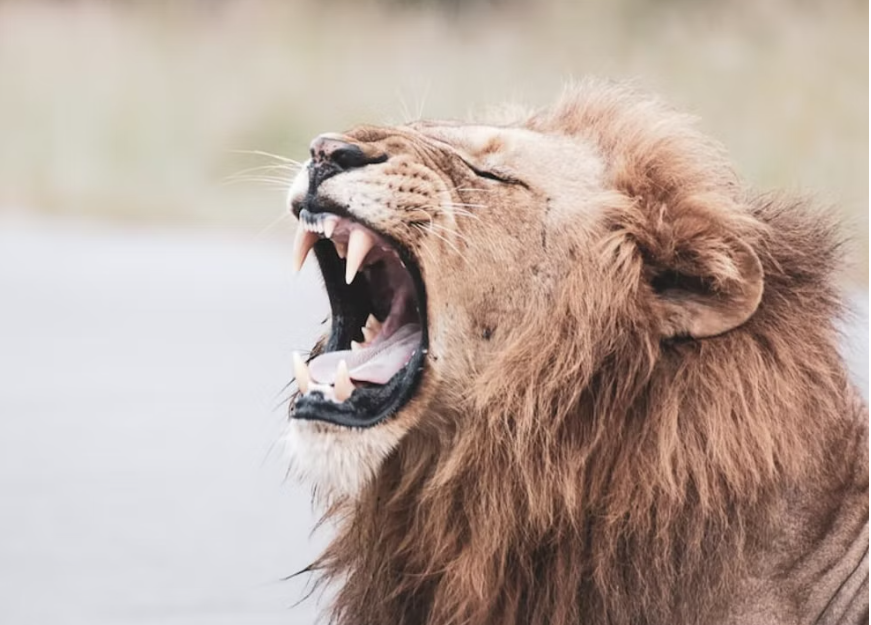A conservation organisation supports Okavango Delta communities to coexist with lions
GPS tech alerts villagers to nearby lions, while trained herders protect cattle

Botswana has always been famous for its high-value, low-volume wildlife tourism strategy which is aimed at minimising negative environmental impacts on the country’s pristine wildlife areas.
The largely foreign-owned luxury safari resorts around the Okavango Delta have over the years become the favourite hang-out places for some of the richest and most famous faces across the world – from former US President George W Bush, talk show and media mogul Oprah Winfrey, supermodel Heidi Klum, to the royals in Prince Harry and wife Meghan.
But while the rich enjoy the best of what Botswana’s safari experience has to offer particularly the famous big five (lion, cheetah, elephant, buffalo, and rhino), poor villagers within a few kilometres’ radius of the luxury resorts are not as happy to see the wildlife.
It is a constant struggle for survival. If it is not about staying alive, or protecting their property from destruction, it’s about making ends meet for the poverty stricken communities living on less than US$1 (£0.8) a day.
Pastoral farmers are constantly counting losses as predators enjoy a lion’s share, literally and figuratively, of their livestock.
In retaliation farmers have over the years resorted to poisoning the lions to stop them from constantly feasting on their livestock. As human populations and settlements expand,
rangelands for both lions and their prey has declined, leaving isolated populations that exist in fragmented landscapes. This has forced lions to gravitate towards these communities around the Eretsha, Seronga, Beetsha, Sekondomboro, Ngarange, Mogotho, areas where livestock particularly cattle have become an easy target.
In 2013, villagers set poisoned bait to indiscriminately kill all lions in the area, resulting in the loss of half the regional population that year alone. Poison spills over into the ecosystem, to the detriment of scavengers like hyenas, jackals and vultures, and other species.
In an effort to mitigate the situation and save both the lions and the cattle, Claws Conservancy through their ‘Pride in Our Prides: Conserving lions through collaboration in the Okavango Delta’ initiative, is now working with herders to revivify an old way of moving livestock around that has both a climate benefit and a human wildlife conflict benefit.
Claws Conservancy founder and Executive Director Dr. Andrew Stein, a wildlife biologist, invited local media through the Space for Giants Fellowship Programme to have firsthand experience of the conservancy organisation’s efforts to mitigate the conflict between the lions and the small pastoral community of Eretsha in the eastern Okavango Delta Panhandle.
In 2018, Claws Conservancy supported the establishment of the first communal herd in Botswana. “We had challenges as communities were reluctant to buy into the initiative,” Dr Stein told the visiting group of conservation reporters. He said he was delighted when the Eretsha community became the first to agree to the project.
The project started a communal herding program for Eretsha. “Communal herds reduce conflict by increasing efficiency. A handful of people are responsible for protecting the large herds that mimic the natural formation of wild herbivores, moving in tight groups as anti-predation behaviour. Certified herders monitor livestock and health and protect them from predators, allowing community members to engage in other livelihood activities knowing that their cattle are safe,” Stein said.
In addition, Claws Conservancy in partnership with the University of Siegen, designed a one-of-a-kind lion alert system which warns villagers when collared lions arrive within a given perimeter of livestock areas.
At least 120 participants receive text messages to their mobile phones bearing the name and distance of the specific lion.
“To promote inclusion and sense of ownership for the initiative, we allowed the villagers to name the lions in their own local languages.” Stein said they had received at least 20, 000 alerts so far in 2022, almost twice the 12,000 alerts they received in 2021.
Through the predator-proof communal kraals (enclosures) initiative, Claws Conservancy works with the Eretsha community to reduce incidences of livestock killings by keeping the cattle safe overnight.
Herders, currently remunerated by Claws, take turns looking over the cattle at night and herding during the day. Journalists had the opportunity to track one of the lions causing havoc in the area, which they found taking the day off from the scorching summer temperatures to cool off under a thick bush, a safe distance from the cattle grazing perimeter.
Stein, together with his colleague Dr. Edwin Mudongo (a wildlife and rangeland ecologist with over 10 years’ experience in sustainable natural resources management) wants to expand the communal herding programme to the neighbouring communities and eventually to other affected areas in western Botswana particularly around the Central Kalahari Game Reserve (CKGR) in the desert. One large continuous population of lions continues to roam across the Kavango-Zambezi Transfrontier Conservation Area (KAZA) which includes Botswana, Namibia, Zimbabwe, Angola, and Zambia.
The CLAWS Conservancy is a registered nonprofit organisation whose mission is to develop innovative approaches to promote human- wildlife coexistence. Their focus is on high-priority species and known conflict areas. They build partnership networks and use scientific research into the status and ecology of large carnivores, and create assessments of possible tools and solutions.
CLAWS develops economic, social and ecological approaches for human-wildlife coexistence, and coordinates efforts between various stakeholder groups including government agencies, community groups, non-profit organisations, academic institutions, tour operators and researchers for effective implementation.
This article is reproduced here as part of the African Conservation Journalism Programme, funded in Angola, Botswana, Mozambique, and Zimbabwe by USAID’s VukaNow: Activity. Implemented by the international conservation organization Space for Giants, it aims to expand the reach of conservation and environmental journalism in Africa, and bring more African voices into the international conservation debate. Written articles from the Mozambican and Angolan cohorts are translated from Portuguese. Broadcast stories remain in the original language.
Read the original story here:

Join our commenting forum
Join thought-provoking conversations, follow other Independent readers and see their replies